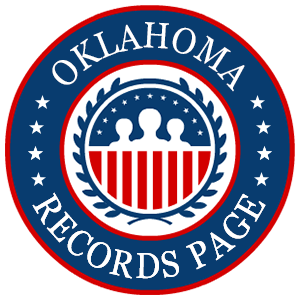Access free Oklahoma marriage records and other similar public information on anyone. This availability can be traced back to the Oklahoma Open Records Act.
This law promotes openness, stating that any public record should be available for review by anyone unless otherwise stated; this includes marriage records. Hence, they’re viewed as public documents, giving citizens free access.
Apart from this, there are also other online free sources described throughout this article that can be utilized to retrieve marriage records in Oklahoma.
Are Marriage Records & Certificates Available to the Public in Oklahoma?
Yes, marriage records are available to the public. However, these records cannot be obtained by just anyone, and require some prerequisites to be completed. The details required are:
- Name of either one of the partners that was married.
- The date of the marriage.
- Name of the county where the marriage took place.
There are also some intriguing facts about marriage licenses in Oklahoma State.1 In 2022 alone, Oklahoma issued a whopping 24,580 marriage licenses. Quite astoundingly, this marks an escalation of 1,273 from the previous count of 23,307 in 2020.
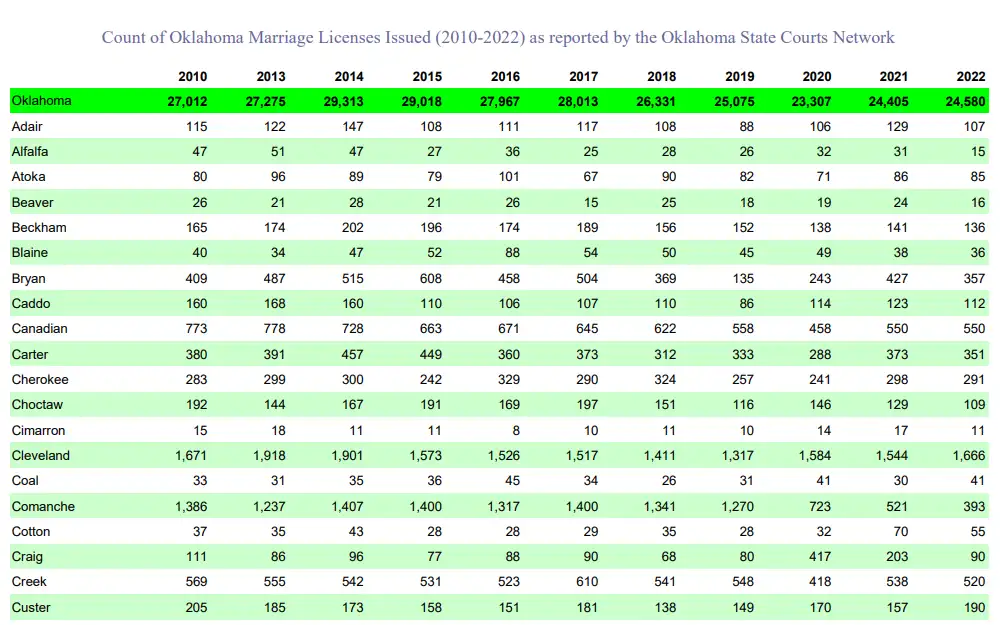
A rise is also observed in Oklahoma’s rate of weddings per thousand individuals – it has been noted that a bump of 0.2 has been observed in marriage rates between 2020-2023, and presently stands at an impressive rate of 6.1 married couples for every thousand people.
How To Look Up Free Oklahoma Marriage Records & Licenses
The marriage records are crucial documents that authenticate matrimonial unions within the Sooner State. The task of issuing birth and death records is assigned to the Oklahoma State Department of Health (OSDH) Office of Vital Records, while the County Court Clerk Offices are responsible for managing the marriage and divorce records.2
For those seeking data regarding marriage or divorce details filed within the state and who might find visiting or calling up Court Clerk Offices inconvenient, there’s the Case Search tool accessible on the Oklahoma State Courts Network (OSCN) website.
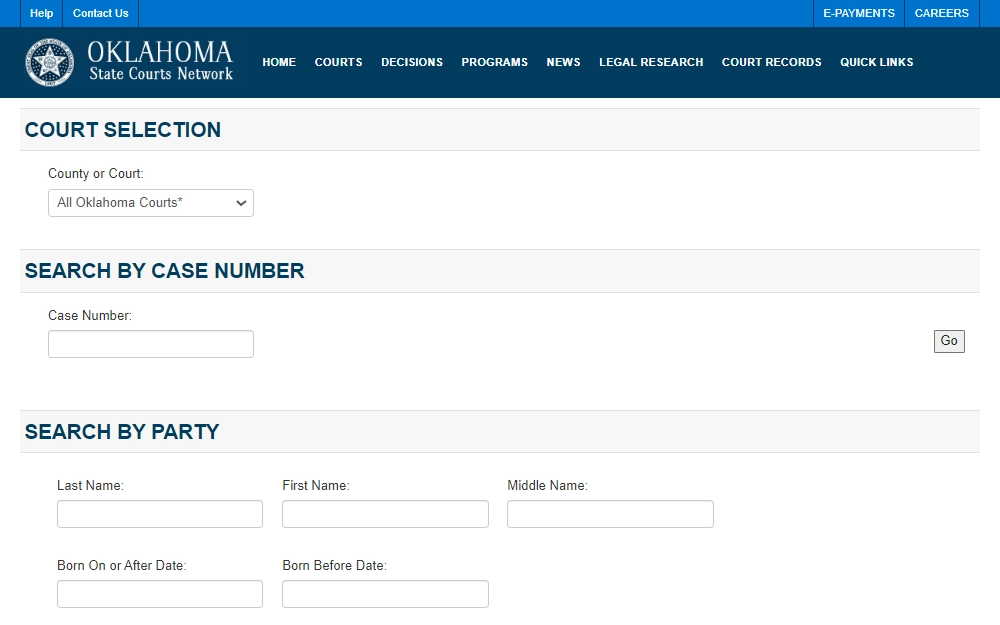
Individuals can begin by proceeding towards the “Search by Party” section. Herein, type in the last name of one spouse in the designated search box. An additional input of first names, middle name or even birth dates could potentially narrow down your results further.
Leave the “Choose a District” section unchanged. The same has to be done with the next section that reads “Appellate Court Case Type.” This should also be left unchanged and should read “All Cases Types”.
In the “District Court Case Type”, the option of “Marriage License” should be selected from the drop-down menu. A quick click on the “Go” button will pull up the required data across all Court Clerk repositories housing any potential marriage record linked to the entered details.
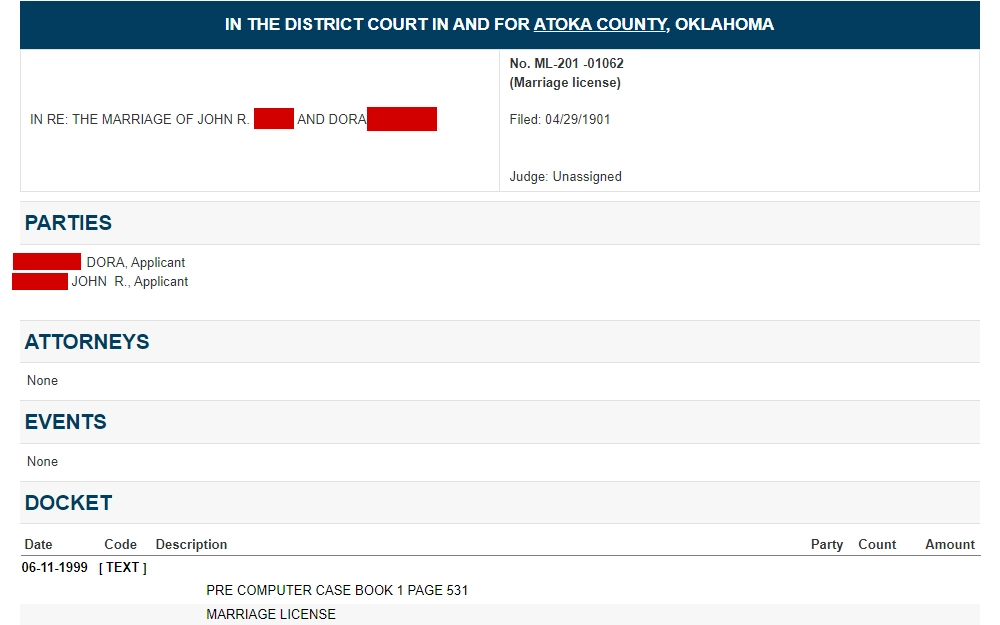
Meanwhile, if anyone wants more guidance about using this online tool effectively for tracking marriage records, then contacting Local County Court Clerk Offices can provide necessary insights, too.
Court Clerks are responsible for documenting, cataloging and managing the proceedings of the District Court. The Court Clerks are also in charge of offering marriage licenses, in addition to beer permits, gaming hall agreements and other licenses applicable for that county.
Checking Counties & Cities for Marriage Records in Oklahoma
As discussed previously, Oklahoma marriage records are maintained at the county level by the County Court Clerks’ offices.
They are not maintained at the district or state level. Individuals seeking to get access to these records can get in contact with their County Court Clerk offices and request the records in person, through mail, phone or via accessing any online tools the office may offer.
For Oklahoma County, the entire process can be initiated from wherever you are, since it is online. First, you must visit the Oklahoma County Court Clerk’s record request page.5 There, you’ll find a simple form to fill in with various details about yourself, which will guide your record site search.
To successfully request your copy online, several pieces of information need to be provided: your full name, date of birth, and significant specifics such as when this union was officially recognized (i.e. the date of marriage).
After submitting the details electronically, individuals are requested to wait for approximately 10 business days – the county court clerk’s office will get back to confirm associated fees due, based on their operational terms and costs.
The process is initiated after proof of payment is received—a step done via check or money order payment modes. It’s important to remember that the processing timeframe begins once payment has been received.
Now, touching upon the fees involved; the County Court Clerk’s fee for every record requested varies depending on what the applicants exactly need. If it is individual pages of the marriage certificate citizens are interested in, a basic $1 cost applies for the first page, with a reduced amount of 50 cents for each additional page needed thereafter.
For those seeking certification documents, such as verification of specific details, an extra charge of just 50 cents covers it all. A certified copy costs $2 — a certified copy validates your legal status making it easier to perform tasks like changing names or submitting applications. You can make payments by mail on the following:
Oklahoma County Court Clerk
320 Robert S. Kerr #409
Oklahoma City, Oklahoma 73102
Residents in Tulsa County that require access to the County’s marriage records will need to carry out the following steps:
First and foremost, citizens must understand that these public documents are available online. It should, however, be noted that although acquiring the records may seem enticing, their sanctity must always remain undisturbed; not removed or modified under any circumstance.
To access the records, you need to visit the Open Records section of Tulsa County’s website. Once users do so, they will be redirected to fill out an online form that asks for specific information, like the type of records being requested, the name of the requestor, phone number, address, etc. The site also provides a physical form that can be accessed and filled manually.
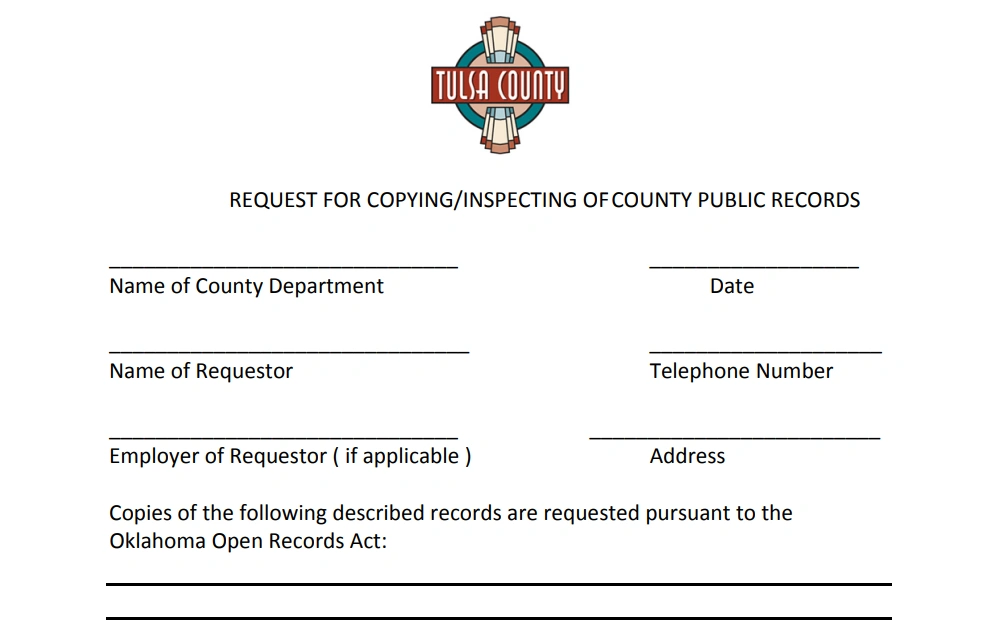
The physical form must be completed and mailed to the following address:
Tulsa County Headquarters
218 W. 6th Street.
Tulsa, Oklahoma, 74119-1004
Phone: 918.596.5000
The copies do come with associated costs based on the type of records requested, requests for which are processed once prepayment is received. For those who prefer hardcopies, legal sized paper costs $0.25 per page, whereas ledger sized paper is charged at $0.50 per page.
Then come certified copies, which are often considered to have a greater seal of trustworthiness costing at just $1 per page. For those seeking paper larger than 11 x 17, copies made on microfilm or other special forms of print can also be acquired, subject to the actual cost associated with such requests.
For those living in Cleveland County, acquiring the marriage records can be done by contacting the Cleveland Court Clerk’s Office. It is their responsibility to manage and supply all documents pertaining to marriage records, along with providing marriage licenses.
Interested citizens can drop by their office at the following address:
Cleveland Court Clerk’s Office
200 S Peters Ave #10
Norman, Oklahoma 73069
Phone: 405-321-6402
Hours: Monday – Friday, 8 am – 5 pm
In some states, it’s advisable to search for marital records at the city level if municipal offices host them. While marriage certificates are not hosted by city custodians in Oklahoma, there may be more than one county office location so that individuals can contact or visit the one closest to them.
For instance, citizens in Broken Arrow don’t have to visit the Tulsa County office mentioned above; instead, they can enjoy the proximity of the Broken Arrow satellite office. To determine if other counties have additional offices, interested parties can type “[city name] Oklahoma marriage records” into any search engine and review the results.
Those interested in finding records about genealogy can do so by getting in touch with organizations that keep archived records. These organizations may contain records pertaining to land, marriage and other vital information. Acquiring such information is discussed in detail in the following section.
How To Find Historical & Archived Marriage Records in Oklahoma (Genealogy Research)
Individuals interested in tracing back their family’s roots can do so through the Research Center (an Oklahoma government-endorsed site). They hold an extensive database offering ancestral marriage records.
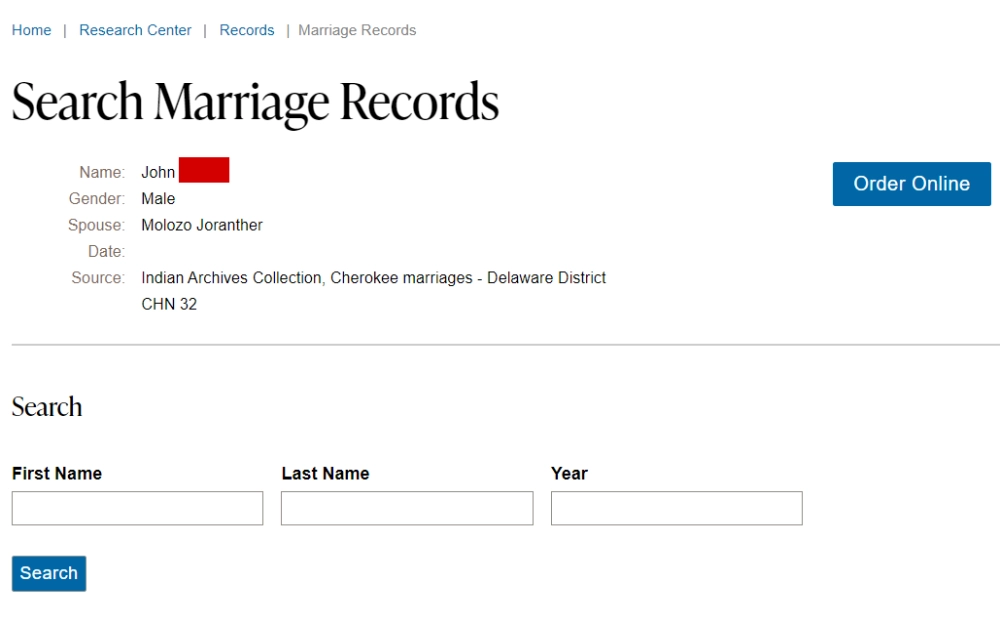
To obtain these marriage records, a nominal fee of $15 is required. This data is known to bring applicants closer to understanding where they came from, making this genealogical expedition more meaningful.
You can also reach out to the Research Center via the following contact information to inquire more about the marriage records:
Oklahoma Historical Society
800 Nazih Zuhdi Drive
Oklahoma City, Oklahoma 73105
Phone: 405-521-2491
The marriage records held by the Research Center cover the state and date as far back as 1889 up until mid-twentieth-century, to 1951. As times changed, so did every record used at marriages, the records began to accompany unique bits of info, specific but different during each period.
For instance, older records tend to include the names of the bride and groom, their ages, ceremony dates and sometimes even the place of birth. In contrast, newer records also include the address.
Apart from collecting information at the Research Center, family histories can also be unearthed, to know more about the applicant’s genealogical background. In addition to seeking out records, individuals can also engage in conversations with the oldest members of the family, such as parents or grandparents, to know more about one’s lineage.
People can also scout old letters, photographs or existing lists of family members to learn more about their ancestors’ roots.
Interested individuals can also contact the Lawton Public Library, which holds the grandest collection of Oklahoma genealogies, with maps, periodicals, family classifications, life accounts and a comprehensive roster of all the state’s territory tract books.
Accessing records from the University of Oklahoma Libraries is also recommended, as it has some noteworthy collections.8 The library also provides biographical data for various ethnic groups as well, including native Indians.
Does Oklahoma Recognize Common Law Marriages?
Common law marriage is recognized and reasonably common in Oklahoma. This type of union provides an alternate route for couples seeking legal recognition for their relationship without going through the traditional process of obtaining a formal marriage license.
Understood broadly, a common law marriage can be seen as quite simply a legal contract between two individuals who meet certain conditions laid out by the state; no fancy wedding or significant paperwork is required. In Oklahoma, this form of union does hold validity under the law, which effectively places it on par with typical marriages.
As per Section 43-214 of the Oklahoma State Statute, partners in common-law married relations enjoy several rights and benefits, same as their traditionally-married counterparts do. These include asserting claims on properties and assets jointly acquired during the relationship period. Also noteworthy are companionship gains, the custody rights over children born within the said union as well as visitation perks.
Before jumping into common-law matrimony, interested individuals should understand some requirements outlined in the Common Law Marriage Guidelines:9
- Firstly, both parties must have attained at least 18 years of age.
- Secondly, a person seeking such coexistence should not be related by blood to an extent that would prevent a lawful marriage.
- Lastly, neither party can already have a living spouse during the time of their common law marriage.
Should two individuals wish to initiate a common-law marriage within Oklahoma’s borders, they are required to complete and ratify a statement representative of their union in the presence of an accredited notary public. This document serves as concrete evidence acknowledging their relationship status under Oklahoma law.
However, it is vital for prospective couples considering this route not to mistake cohabitation as equivalent to marriage; although both involve two parties residing together, legal implications differ substantially between them.
The key divergence between cohabitation agreements and common-law marriages manifests at the end of the relationship.
When a common-law marriage ends, it necessitates a legal process similar to that of a standard marriage termination, that is divorce. The parties involved in the union are required to visit court in order to reach settlement terms similar to those enforced during conventional divorces involving distribution of property, alimony and child custody matters amongst others things.
On the contrary stands the cohabitation agreement. In case one party decides they want to end the union, there is no compulsory enforcement for attending courtrooms or hiring divorce attorneys.
However, this does not imply that such an arrangement lacks protective measures for both individuals involved. Cohabitation agreements have particular legal tools incorporated into their design, which guard against one partner laying claim over shared properties and other assets.
In Oklahoma, same-sex marriage has been legitimate since October 6, 2014, as a result of judicial decisions tackling the restriction on such marriages. That being said, civil unions, domestic partnerships or any other kind of relationship is not accepted in the state, so Oklahoma marriage records will not be available for these types of partnerships.
How To Find Common Law Married Couples in OK
Oklahoma acknowledges common law marriages and keeps track of them meticulously. These details are public records and available to anyone interested in gaining access – be it for genealogical research or legal purposes.
Interested individuals can begin their search for these records from the website of the Oklahoma State Courts Network itself. You can search for cases by case name, case number, or docket number. If you are not sure of any of this information, you can search by party name.
How To Apply for a Marriage License in Oklahoma
The first step involved in getting married is acquiring a marriage license. In Oklahoma, this begins with understanding that they are provided by each county’s Court Clerk Offices.10
This means any couple willing to tie the knot should get their licenses issued from this particular office situated in every county and more importantly, only those satisfying all eligibility criteria and carrying necessary documents will be granted this document to officiate their vows.
The fee associated with processing these licenses often goes up to $50 for each couple. Still, couples who present an authentic certificate proving completion of premarital counseling sessions of over four hours qualify for a lowered cost amounting just $5. Those experiencing difficulty finding such classes can rely on assistance of the Oklahoma Marriage Initiative — designed specifically for this purpose.11
While pursuing these licenses, two things stand clear. Both individuals must apply together and physically travel to submit applications. They should also have the relevant identification documents, this includes either their valid driver’s license, state-issued photo ID, passport, certified birth certificate or a military ID.
For those possessing foreign IDs or passports, it’s important that you accompany your application process with your birth certificate translated into English along with its original copy.
As soon as an individual attains an Oklahoma marriage license, they should keep in mind that this coveted document is only valid for 30 days post the date it was issued.
Once compiled completely and neatly signed by all appropriate parties, the license needs to be returned back to the relevant County Court Clerk’s office within exactly 30 days after being issued.
The steps highlighted above provide comprehensive details on how to find and access Oklahoma marriage records for those seeking them; for additional public records such as divorce, property taxes, births, deaths, and criminal records, you can refer to the Oklahoma free public information search tutorial.
References
1Oklahoma State Department of Health. (2023, July). Marriage and Divorce Statistics. Retrieved November 1, 2023, from <https://oklahoma.gov/content/dam/ok/en/health/health2/aem-documents/data-and-statistics/center-for-health-statistics/health-care-information/vital-statistics/Final_MarriageDivorce_Report2022_a.pdf>
2Oklahoma State Department of Health. (n.d.). Vital Statistics. Retrieved November 1, 2023, from <https://oklahoma.gov/health/health-education/data-and-statistics/center-for-health-statistics/health-care-information/vital-statistics/vital-statistics-data-and-reports.html>
3Oklahoma State Courts Network. (n.d.). Search. Retrieved November 1, 2023, from <https://www.oscn.net/dockets/Search.aspx>
4Oklahoma State Courts Network. (n.d.). Marriage License. Retrieved November 1, 2023, from <https://www.oscn.net/dockets/GetCaseInformation.aspx?db=atoka&number=ML-201%20-01062&cmid=27737>
5Oklahoma County Court Clerk. (n.d.). Request Records. Retrieved November 1, 2023, from <https://www.oklahomacounty.org/elected-offices/court-clerk/request-records>
6Tulsa County Clerk. (n.d.). Request for Copying/Inspecting of County Public Records. Retrieved November 1, 2023, from <https://www2.tulsacounty.org/media/kt0jv4q1/openrecordsrequestform_4302019.pdf>
7Oklahoma Historical Society. (n.d.). Search Marriage Records. Retrieved November 1, 2023, from <https://www.okhistory.org/research/marrrecord?id=115584>
8University of Oklahoma. (n.d.). Digital Collections. University Library. Retrieved November 1, 2023, from <https://digital.libraries.ou.edu/cdm/>
9Personnel Department/Employee Benefits Division. (2006, April). Statement of Common Law Marriage. Retrieved November 1, 2023, from <https://www.okc.gov/Home/ShowDocument?id=2756>
10Oklahoma State Courts Network. (n.d.). The Oklahoma Court System. Retrieved November 1, 2023, from <https://www.oscn.net/applications/oscn/start.asp?viewType=COURTS>
11U.S. Department of Health and Human Services| Office of the Assistant Secretary for Planning and Evaluation. (n.d.). Oklahoma Marriage Initiative (OMI): A Process Evaluation: Research Brief. Retrieved November 1, 2023, from <https://aspe.hhs.gov/reports/oklahoma-marriage-initiative-omi-process-evaluation-research-brief-0>
